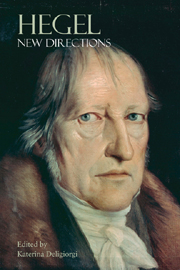Book contents
- Frontmatter
- Contents
- Contributors
- Acknowledgements
- Abbreviations
- Introduction: On reading Hegel today
- 1 Hegel on conscience and the history of moral philosophy
- 2 The apperceptive I and the empirical self: towards a heterodox reading of “Lordship and Bondage” in Hegel's Phenomenology
- 3 Hegel, McDowell and recent defences of Kant
- 4 Substance, subject and infinity: a case study of the role of logic in Hegel's system
- 5 Dialectic as logic of transformative processes
- 6 Hegel, ethics and the logic of universality
- 7 Recognition and reconciliation: actualized agency in Hegel's Jena Phenomenology
- 8 The contemporary relevance of Hegel's practical philosophy
- 9 Catching up with history: Hegel and abstract painting
- 10 New directions in Hegel's philosophy of nature
- 11 Hegel and the gospel according to Immanuel
- 12 What is conceptual history?
- 13 On Hegel's interpretation of Aristotle's psyche: a qualified defence
- Bibliography
- Index
2 - The apperceptive I and the empirical self: towards a heterodox reading of “Lordship and Bondage” in Hegel's Phenomenology
- Frontmatter
- Contents
- Contributors
- Acknowledgements
- Abbreviations
- Introduction: On reading Hegel today
- 1 Hegel on conscience and the history of moral philosophy
- 2 The apperceptive I and the empirical self: towards a heterodox reading of “Lordship and Bondage” in Hegel's Phenomenology
- 3 Hegel, McDowell and recent defences of Kant
- 4 Substance, subject and infinity: a case study of the role of logic in Hegel's system
- 5 Dialectic as logic of transformative processes
- 6 Hegel, ethics and the logic of universality
- 7 Recognition and reconciliation: actualized agency in Hegel's Jena Phenomenology
- 8 The contemporary relevance of Hegel's practical philosophy
- 9 Catching up with history: Hegel and abstract painting
- 10 New directions in Hegel's philosophy of nature
- 11 Hegel and the gospel according to Immanuel
- 12 What is conceptual history?
- 13 On Hegel's interpretation of Aristotle's psyche: a qualified defence
- Bibliography
- Index
Summary
1. Hegel's Phenomenology traces an education of consciousness, as a result of which it is to attain the standpoint of absolute knowing. For consciousness (as such) its object is other than itself. The goal is for this otherness to be aufgehoben – cancelled as the simple otherness it at first appears to be, although preserved at a higher level, as a “moment” in a more comprehensive conception. Enquiry will then in principle be able to avoid a certain sort of philosophical anxiety. We shall no longer need to be troubled by the spectre of a gulf between subject and object, which is the pretext for a transcendental scepticism.
2. At the standpoint of absolute knowing, the progress of knowledge is to become intelligible as the free self-development of “the Notion”. Hegel sees this conception as indebted to Kant, in a way he makes explicit when he writes, in the Science of Logic: “It is one of the profoundest and truest insights to be found in the Critique of Pure Reason that the unity which constitutes the nature of the Notion is recognized as the original synthetic unity of apperception, as the unity of the I think, or of self-consciousness” (L: 584). This is obviously an allusion to the transcendental deduction. There – especially in the second-edition recasting – Kant comes close to Hegel's conception of absolute knowing.
I shall begin by spending some time on this Kantian background. That will place the apperceptive I, whose unity is the unity of the I think, in the picture.
- Type
- Chapter
- Information
- HegelNew Directions, pp. 33 - 48Publisher: Acumen PublishingPrint publication year: 2006
- 6
- Cited by



